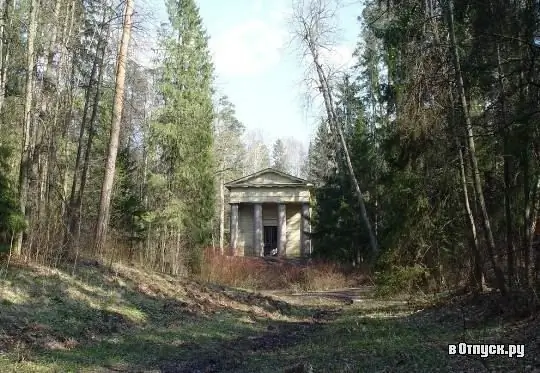
Description of the attraction
The only architectural monument in the area of Nova Sylvia in Pavlovsk Park is the Mausoleum of Paul I. This is not the tomb of the emperor. Paul I, like all members of the imperial family, was buried in the Peter and Paul Cathedral in St. Petersburg. In archival documents this park building is called "Monument in the city of Pavlovsk". In one of her letters, Empress Maria Feodorovna mentions it as a "Monument", and in an agreement with the architect Carlo Domenico Visconti calls it "Temple". The modern name is "Spouse-Benefactor" or "Mausoleum of Paul I".
Wishing to perpetuate the memory of her late husband, the Dowager Empress Maria Feodorovna commissioned several architects to design the monument. In 1805, she approved the design work of the architect Tom de Thomon, based on the motif of the facade of the tombstone of Sophia Dorothea, the mother of Maria Feodorovna, buried in Charlottenburg.
In 1805, the foundation stone of the Mausoleum was carried out in the summer. The stone craftsman K. Visconti was engaged in its construction. A memorial without burial or, in other words, a false tombstone (cenotaph) was sculptured by the famous Russian sculptor Ivan Petrovich Martos. In 1810, the opening ceremony of the Mausoleum took place.
The mausoleum to the Benefactor-spouse is located in the depths of Pavlovsky Park, in a difficult-to-pass forest, on the bank of a ravine. It is made in the form of a small Greek prostyle temple with a four-column portico. Doric columns, carved from red granite, set off gray marble capitals. The walls of the Mausoleum are made of bricks, finished with yellowish sandstone. The doorway is located in the center of the main facade. On the pediment of the doorway there is an inscription made of embossed gilded letters - "To the Benefactor Spouse". In addition, on the southern pediment you can read: “To Paul I to the Emperor and Autocrat of All Russia. Born on September 20th, 1754. Who died on the 11th day of March 1801”.
High openwork doors made of iron, made according to the sketches of Tom de Thomon, lead to the Mausoleum. Gilded burial emblems: inverted torches and teardrop vases are on the door grill. The walls of the Mausoleum are faced with artificial marble in white tone. At the bottom, it is shaded by a tall dark gray marble panel. The high relief depicts the "Allegory of History" figure by the sculptor Jean-Baptiste Nashon.
On the south wall, or rather on the high relief, in the center, on a low pedestal, there is an image of an urn covered with drapery. The folds of the mournful bedspread widely diverge and fill the entire central high-relief part. On the sides of the urn there are two figurines of sobbing cupids, in their hands are inverted torches. On the right side of them - a globe, on the left - a palette with brushes. The sculptural ensemble "Grieving Arts and Sciences" belongs to the sculptor Joseph Camberlin. The sketches for both high reliefs were developed by the architect Tom de Thomon.
The premises of the Mausoleum are made in an emphatically ascetic manner. All attention is drawn to the monument. Here, against the background of a dark red granite pyramid, a sculptural composition of white marble is installed. We see a kneeling woman in antique clothes, in sorrow, crouching down to the funeral urn. The crown on her head is evidence of the dignity of the mourner. The sculpture is located on a high pedestal and is decorated with a bas-relief, which allegorically depicts all the children of Paul I at the time of his death, or rather on March 11, 1801. The pedestal and the pyramid belong to the work of stone cutter Samson Sukhanov.
During the Great Patriotic War, the park pavilion, the Mausoleum to the Benefactor Spouse and the cenotaph were destroyed. After the war, a lot of reconstruction activities were organized here.






